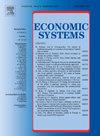辍学的决定因素及其对青年失业的影响:埃塞俄比亚的证据
IF 3.3
2区 经济学
Q1 ECONOMICS
引用次数: 0
摘要
尽管埃塞俄比亚青年辍学率很高,但导致辍学的家庭特征以及辍学对青年失业的影响仍不清楚。为了填补这一空白,本研究分析了影响青年辍学的因素,并利用2019年世界银行生活水平衡量研究-农业综合调查的数据评估了辍学对埃塞俄比亚青年失业的影响。我们使用内生转换回归来估计青年辍学对家庭中有失业青年的可能性和家庭中失业青年人数的影响。研究结果显示,不同的父母特征,如年龄、教育程度和父母是否住在一起,与青少年辍学的可能性呈负相关,而穆斯林户主的家庭比东正教户主的家庭更有可能辍学。研究还发现,有多种收入来源、位于农村地区、离学校很远、家庭成员有残疾的家庭更有可能出现青少年辍学。此外,我们的研究结果显示,青年辍学增加了家庭中失业青年的可能性,并增加了家庭中失业青年的数量。该研究的结果强调,在制定教育干预措施以减少埃塞俄比亚的青少年辍学时,需要考虑家庭特征和其他与青少年辍学相关的因素。此外,对父母教育和道路和学校等基础设施的投资可以减少埃塞俄比亚的青年失业率,特别是在公立学校是唯一选择的农村地区。本文章由计算机程序翻译,如有差异,请以英文原文为准。
Determinants of school dropouts and the impact on youth unemployment: Evidence from Ethiopia
Despite significant youth school dropouts in Ethiopia, the household characteristics that contribute to dropouts and the impact of dropouts on youth unemployment remain unclear. To fill this gap, this study analyzes the factors that influence youth dropouts and evaluates the impact of dropouts on youth unemployment in Ethiopia using data from the 2019 World Bank Living Standards Measurement Study-Integrated Surveys on Agriculture. We employ endogenous switching regression to estimate the impact of youth dropouts on the likelihood that a household has unemployed youths and the number of unemployed youths in the household. The findings reveal that different parental characteristics such as age, education, and whether parents live together are negatively associated with the probability of youth dropouts, while households with a Muslim head are more likely to have school dropouts than Orthodox-headed households. Households who have multiple income sources, are located in rural areas, are located far from the school, and have disabled family members are also found to be more likely to have youth dropouts. In addition, our findings reveal that youth dropouts increase the probability of having unemployed youths in the household and raise the number of unemployed youths in the household. The study’s findings highlight the need for considering households’ characteristics and other factors associated with youth dropouts when developing educational interventions to reduce youth dropouts in Ethiopia. Furthermore, investment in parental education and infrastructural facilities such as roads and schools could reduce youth unemployment in Ethiopia, particularly in rural areas where public schools are the only option.
求助全文
通过发布文献求助,成功后即可免费获取论文全文。
去求助
来源期刊

Economic Systems
ECONOMICS-
CiteScore
4.90
自引率
0.00%
发文量
83
审稿时长
48 days
期刊介绍:
Economic Systems is a refereed journal for the analysis of causes and consequences of the significant institutional variety prevailing among developed, developing, and emerging economies, as well as attempts at and proposals for their reform. The journal is open to micro and macro contributions, theoretical as well as empirical, the latter to analyze related topics against the background of country or region-specific experiences. In this respect, Economic Systems retains its long standing interest in the emerging economies of Central and Eastern Europe and other former transition economies, but also encourages contributions that cover any part of the world, including Asia, Latin America, the Middle East, or Africa.
 求助内容:
求助内容: 应助结果提醒方式:
应助结果提醒方式:


